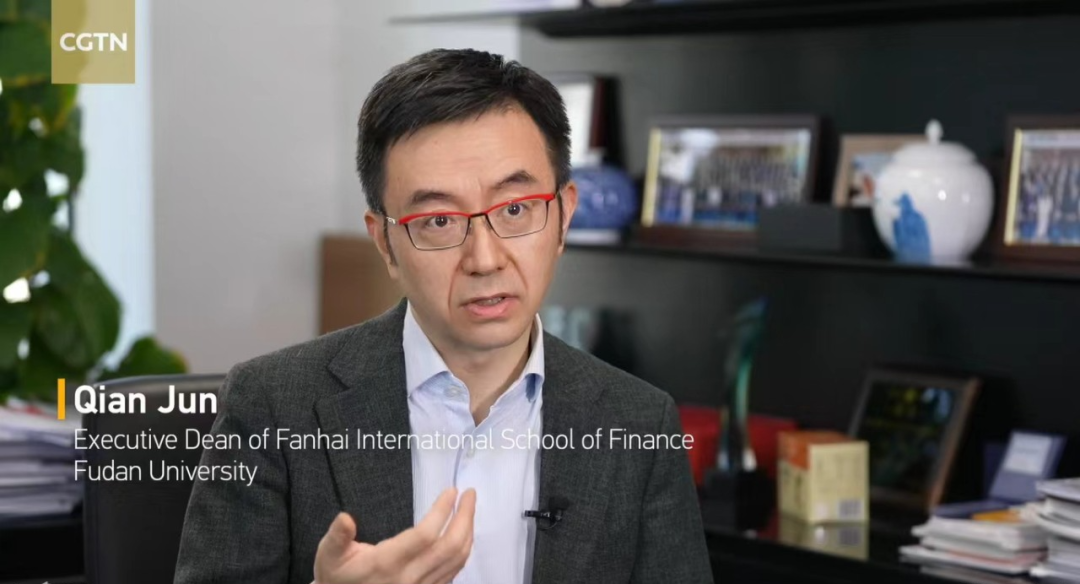
-
 86-21-63895588
86-21-63895588
-
 No.1, Lane 600, Nanchezhan Road, Huangpu District, Shanghai 200011
No.1, Lane 600, Nanchezhan Road, Huangpu District, Shanghai 200011
Release time:2023-01-25
With the gradual optimization of China’s pandemic prevention and control policies, the domestic economy has been recovering overall. Recently, Jun Qian, Executive Dean of FISF, Professor in Finance and Member of the 14th Shanghai Municipal Committee of the CPPCC, accepted an exclusive interview with China Global Television Network (CGTN), giving an in-depth insight into China’s capital market trend in 2023 as well as the prospect of various fields like consumption, trade and real estate.

Jun Qian (Executive Dean of FISF, Professor in Finance)
Click the picture to watch the video report
“The financial market, particularly the stock market, will lead the revival of the physical economy.” said Professor Jun Qian, “Actually we have seen many companies from Mainland China be listed and conduct trades in the Hong Kong market. Previously the Hong Kong stock market went through a major adjustment and is now in an optimistic rebound, which is expected to continue in the future. As estimated, the stock market can anticipate an overall economic revival once economic activities are freed from restriction after the optimization of the pandemic prevention and control policies.”
“Unlike the capital market, a number of industries in China may possibly see recovery in consumption in a “V-shaped” manner. For example, consumption in the industries of film and tourism industries will welcome a great upsurge during the 2023 spring festival.” Professor Jun Qian stated. According to medical experts’ opinions and relevant data, it usually takes weeks for urban populations to recover after the peak period of the widespread outbreak of COVID-19 this time, and therefore it can be forecasted that domestic consumption will witness a rapid comprehensive rebound around Spring Festival. Consumer demands in some industries that have suffered greater losses from the pandemic will soon pick up, displaying the so-called “retaliatory consumption”.
At the end of 2022, news came in an endless stream that policies involving the real estate industry in multiple areas were loosened. Will the real estate industry in China bottom out this year? As for this issue, Professor Jun Qian confirmed that the stability of the real estate market did create favorable conditions for the overall revival of the economy. “We are glad to see that since November, central governments, industry regulators and stock market regulators have all declared support and relief measures in various forms, and loosened restrictions on the financing and operating of the real estate market, leading to its steady revival. At the same time, it is noteworthy that some real estate companies are going to have their debts due in the coming 6 months, and thus need financial aids like leverage lowering to avoid debt default, which may possibly bring risk transmission.”

Click the picture to watch the video report
When it comes to global trade, despite the many challenges brought by economic uncertainties to the global economy over the past year, China managed to sustain a constantly increasing trade growth, achieving an over 8% growth of the gross value of imports and exports in the first 11 months in 2022. However, challenges still existed. In November alone, exports only increased by 0.9% on a year-on-year basis while imports even decreased. For this, Qian analyzed that many foreign trade enterprises, though faced with a variety of uncertainties for a certain while, could still stay calm and focus on seeking opportunities, organizing labor forces, and manufacturing high-quality products rapidly and efficiently to meet the needs of the world. Such resilience is a major reason for the success of China’s trade. With social activities gradually returning to normal, China has broken through the economic uncertainties in 2022. It is estimated that in the new year, China’s import demands will recover comprehensively, achieving a growing import quantity; while on the other hand, export, with the still existing uncertainties, will depend on the economic conditions of the areas in need of goods and services exported from China. If an economic recession occurs in some areas, then the need for export goods from China will decline accordingly.